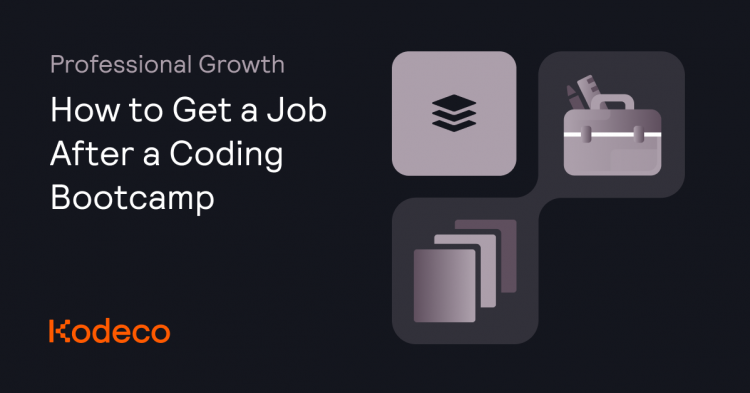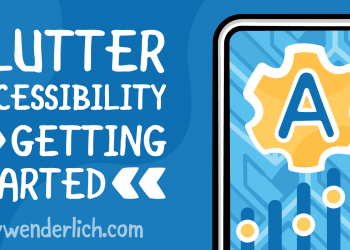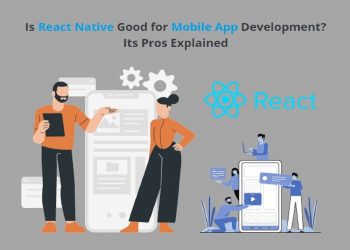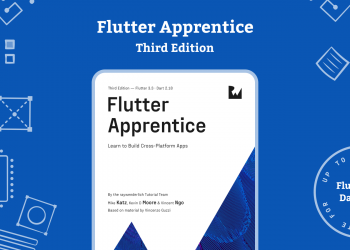So you’ve graduated from a coding bootcamp… now what? Learn the next steps you need to take to get a dev job after your bootcamp is done.
The hardest part of breaking into the tech industry is getting your foot in the door after a bootcamp. A lot of companies are hesitant to hire someone who, on paper, has only 12 weeks of coding experience — but you definitely have a lot to bring to the table. Once you have your resume prepared, how do you get your first job?
What You’ll Learn
- What kinds of companies you should apply to for your first job.
- How to avoid scams and fake job postings as a Junior iOS Developer.
- How to show off your app-making skills.
- Tips for networking and marketing yourself as a bootcamp graduate.
Where Should I Apply?
Choosing the right places to apply is your first big challenge. You want a place where you can learn best coding practices, grow your skill set and contribute to an app that’s in the App Store and has a user base. Working on an app that’s already established lets you see examples of production code, while working on a team will ensure that you’re getting feedback on your work and building good coding habits.
Start by applying to large companies. They are more likely to have the resources to hire people who aren’t as experienced. Additionally, many large companies actually prefer to hire entry-level programmers because it’s easier to train a developer to code to their exact industry standards than it is to hire a senior developer and have them unlearn their regular habits. Good examples of large companies to apply to are banks, credit card companies, large shopping chains, mobile development agencies or any app installed on your phone.
After bootcamp, look for a job where you’ll improve your dev skills. Photo by X on Unsplash
If you prefer to apply to a small startup, be mindful of a few things. First, most startups getting off the ground will be very lean. There’s a good chance you will be the only developer for a simple “proof of concept” app to show off to investors. While the proof of concept may be simple and easily within your skillset, if you aren’t receiving feedback from other team members, you may start unknowingly building habits that make it more difficult for you to work with a team.
Second, starting a business is very difficult and many startups never make it to the App Store! You want to focus on building up a portfolio of projects you’ve worked on, and if you spend six months working on an app that never launches, it becomes more difficult to market yourself to future employers who want to see examples of your work.
How Should I Apply?
The best way to apply for jobs is directly through a company’s website. Large companies with brand recognition usually don’t post on job sites like ZipRecruiter or Indeed.com. Instead they have a job portal or a careers section on their website.
If you see a job posting on a job board, search for the company online and see if you can apply directly through the company website. It is much more likely an employee will see your application if you apply directly.
If the company has their own private job portal, create an account and sign up for email notifications about new job postings that include terms like ‘mobile’ or ‘iOS.’
If there’s somewhere you want to work that doesn’t have any open iOS positions listed, don’t be afraid to send an email and ask about any upcoming openings. Many large companies limit how many open positions can be posted in their job portal at one time, or a position could still be in the approval process through HR.
Sometimes talking to the right person at the right time can get you an interview for a job that hasn’t even been posted yet. These positions are often filled before the job posting is made public.
Don’t be afraid to inquire about internships at companies you’re interested in. A surprising number of places don’t post internships online because these positions get filled mostly through connections. If you send an email and show that you’d be really excited to work there, you might be surprised.
I worked for a company that once hired someone for a summer internship even though we weren’t planning on hiring one because a recent graduate sent an email with a great cover letter and examples of their work.
If you apply for an internship, make sure you’re getting paid! There are laws about unpaid internships that you can research for different areas, but a general rule is that if you are working on a project that is public-facing and not specifically internal, you should be paid.
If you’re considering an unpaid internship, make absolutely sure that it is worth your time and that you’ll be working directly with other experienced coders who will mentor and teach you.
And if a startup offers to pay you in stock shares that aren’t worth anything yet, that does count as unpaid. :]
Avoiding Scams
So you’ve updated your LinkedIn bio to include ‘iOS Developer’ and you’re starting to get a lot of emails and phone calls from recruiters. Wow, every other field has the applicants hunting for jobs! In tech, do the jobs just come to you?
Well… if something sounds too good to be true, it usually is.
While recruiters can be extremely supportive in helping developers find the right position, most companies don’t pay recruiters to find someone entry level. They usually only hire expensive recruiting firms if they’re on the hunt for a skilled senior developer.
Even if the job posting they’re sending you is legitimate, many recruiters get paid per resume they can provide the client. I’ve caught sketchy recruiters editing my resume to make it look like I had more experience than I did.
If you use a recruiter, go with an actual agency, and not just anyone who sends you an email or calls your phone.
Also, be aware of vague job postings that are only set up to get your information to a recruiting company. If a job description is extremely generic, doesn’t mention the app or company you’ll be working with, doesn’t have a website and is almost identical to other job descriptions you’ve seen at other companies, it’s probably just there to collect your info.
Showing Off Your Skills
The most important thing you can do as a Junior iOS Developer is make sure you have an example of your work available in the App Store. No one except for other developers knows how to clone a project on GitHub, and if someone in HR reviewing your application can quickly download an app you’ve worked on, it’s easy and convenient for them to see that you’re qualified.
Your first app on the App Store can be something really simple, as long as it works. Some simple apps you can upload include:
- A todo list using Core Data.
- An app that uses Apple Maps to show restaurants nearby.
- An app with recipes or articles in a TableView.
- An assignment from your bootcamp.
Don’t let perfectionism stop you from uploading a project to the App Store. Being able to show potential employers something that’s simple and complete is much more valuable than work-in-progress screenshots from a more complex project.
Networking
Networking is an extremely important skill for getting started in tech. Connecting with other iOS developers is a great way to learn what the industry is like, improve your coding practices and learn more about popular tools developers regularly use that you might not know about yet.
Building a professional network is hugely helpful for advancing your dev career. Photo by Chris Montgomery on Unsplash
Communicating with other software engineers can also be a great source of advice about looking for jobs or finding out about upcoming job openings.
iOS Meetups and study groups are excellent opportunities to start networking both online and in person. Prepare for a meetup by having a one-minute ‘pitch’ about yourself and what you do.
While it’s important to have a few sentences ready for when an interviewer says ‘Tell me about yourself,’ your networking pitch should not be the same thing. Keep it brief and casual. Look up the term ‘elevator pitch’ for some ideas on what to say.
Also, if someone at the meetup mentions that their company is hiring, make sure to find them and express that you’re interested in applying.
The best thing you can do to make connections at meetups is to become a speaker! You have the mic and everyone’s attention for a set amount of time — use that time to show off your knowledge and skills. Educate the crowd about something interesting and answer questions. At the end of your talk, have a panel of your slideshow that includes your contact information. You can casually mention that you’re looking for a job.
Example:
“I’m on LinkedIn and Twitter, and you can email me if you want to talk more about the exciting world of SwiftUI. Also, I’m currently open to new job opportunities or internships.”
A few ideas for short and accessible topics you could talk about are:
- XCode keyboard shortcuts people may not know.
- Brief introduction to using a helpful CocoaPod or library.
- Examples of design patterns.
- Getting started with SwiftUI.
Networking after giving a talk is great because people at the event will already know who you are, and they have a built-in conversation starter with you.
Add the people you meet at events on LinkedIn. If they work for a company that you’ve been wanting to apply to, send them a message and ask them what they like about their job or if they have any advice on what to look for when choosing companies to apply to.
If a position at your dream company opens up later and you apply, someone reading your resume might see that you’re already connected with someone at the company. It’s a good thing if someone at the company remembers you from a talk you gave that was directly related to the skills they’re hiring for.
Where to Go From Here?
Now that you’ve learned a few important things about where and how to apply for jobs, it’s time to start applying for them. Upload an example of your work to the App Store. Research companies in your area or check out a few job boards. Take some time to get to know other developers either online or in-person and put yourself out there. It can take several months to get that first job, but once you get it, you’ve completed the hardest part.
Key Takeaways
- Apply to larger companies with resources to train you.
- Don’t be afraid to reach out to companies and ask if they have any roles you would be a good fit for.
- You may not have a lot of experience yet, so it’s important to show that you know the basics and have an app in the App Store.
- Networking and making connections with other people in the industry is extremely important for building your skillset and finding job leads.
About the Author
Jay Strawn is a full-time iOS Developer and bootcamp graduate. He’s worked as a bootcamp instructor here at Kodeco, and has volunteered at tech organizations to review resumes and help people practice interview skills.
Source by www.kodeco.com





















